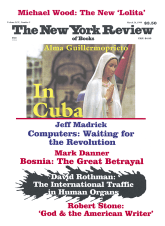In response to:
The Vatican Monarchy from the February 19, 1998 issue
To the Editors:
In an otherwise insightful and engaging piece, Garry Wills makes a significant blunder in his article “The Vatican Monarchy” [NYR, February 19, 1998].
On page 23, he refers to “the Franciscan Bernard of Clairvaux….” Indeed, Bernard belonged to the Benedictine not the Franciscan Tradition.
Later, on that same page, he writes: “Modern Franciscans, despite the warning of Saint Bernard, had made devotion to the Immaculate Conception a staple of their theology.” Modern Franciscans do just that, not despite Saint Bernard’s warning, but on account of the defense of the doctrine of the Immaculate Conception by the fourteenth-century Franciscan theologian John Duns Scotus, among those beatified by John Paul II.
Indeed, Scotus would argue that such a doctrine does not make Mary “superhuman,” as Wills says, but rather the model of what it means to be human.
(Rev.) Anthony M. Carrozzo, O.F.M.
Director, The Franciscan Institute
St. Bonaventure University
St. Bonaventure, New York
JONATHAN LIEBERSON PRIZE
To the Editors:
Your readers may be interested to know that the eighth Jonathan Lieberson Memorial Prize in Philosophy has been awarded to Gurpreet Rattan for his essay “Republicanism and Citizenship.” The award of $1,000 is given by the Columbia University Department of Philosophy for an essay by a graduate student in philosophy at Columbia “showing applicability of moral or scientific theory or both to a social or historical issue.” The award was donated by friends of the late Jonathan Lieberson, who was contributing editor of The New York Review and the author of Varieties.
Charles Larmore
Isaac Levi
Sidney Morgenbesser
Department of Philosophy
Columbia University
New York City
CORRECTION
Several readers have pointed out that the quotation that ends my review of Laurence Lerner’s Angels and Absences: Child Deaths in the Nineteenth Century [NYR, February 19] is not from the Journal of Mary Wollstonecraft, but from that of her daughter, Mary Shelley. My excuse is that The Oxford Book of Dreams attributes this passage (Journal 1815) to Mary Wollstonecraft rather than to her daughter—who was, of course, the one alive at this date.
Rosemary Dinnage
London, England
This Issue
March 26, 1998



